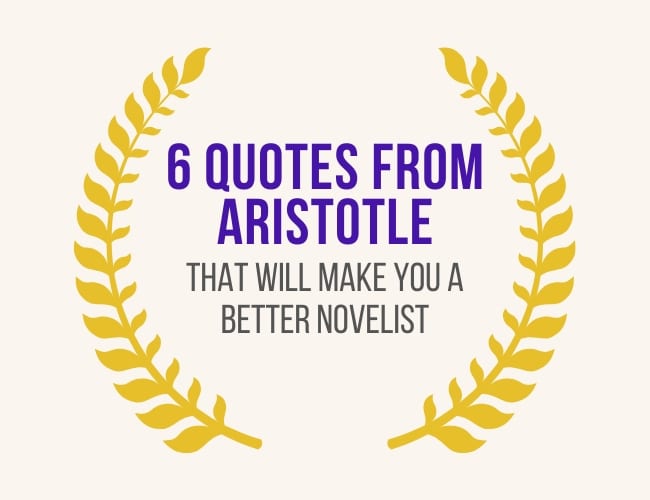Writers love an inspirational quote. But when I came across these quotes from Aristotle's Poetics, I realized that they held more than inspiration–they held real wisdom for novelists. Can these 6 quotes by Aristotle make you a better novelist? Read on to find out.

As of 2019, I’d written zero novels.
I wanted to write a novel but didn’t know how. I wasn’t an English major, didn’t attend an MFA program, and don’t even like writing workshops. Sorry, what can I say? Mostly, I was a closet story junkie—a guy with a penchant for writing, who read an abnormal amount and watched a lot of movies.
Sure, I’d written some big-idea nonfiction books and way too many articles. But a novel? How the heck was I going to do that?
I knew I had a lot of work to do.
I needed to stop focusing on writing and start focusing on story.
For that, I turned to storytelling masters like Aaron Sorkin, David Mamet, and so on—reading, watching, and listening to everything I could get my hands on. Filmmakers? Yup, filmmakers. But this is novel? Again, you are correct, but nothing is better for learning storytelling mechanics than watching films (and plays.)
What I learned quickly was that everything funneled back to Aristotle’s Poetics. It’s hard to find an interview with Sorkin where he doesn’t mention it. Or read a Mamet book where Greek philosopher Aristotle isn’t mentioned. Even the most widely recognized teachers of story craft like Robert McKee, all funnel back to Aristotle. It sort of blew my mind.
I’ve read Poetics too many times along with anything that would aid my understanding of Aristotelian principles. Did I ruin stories forever? Yes, probably as a consumer. I can’t unsee the things I’ve learned. But it also helped me go from writing zero novels to writing three over the last five years.
So here are six quotes from Poetics that helped me write a better novel. Can they help you too? Read on to find out.
6 Quotes from Aristotle to Help You Write a Better Novel
1. “Many poets tie the knot well, but unravel it ill.”
In all stories, there is a complication and a resolution. As this quote illustrates, writing a good complication (“tie the knot well”) won’t guarantee a good resolution (“unravel it ill”). In fact, they’re not related at all—and you can definitely have one and not the other.
Writing a great complication relies on creating tension—someone wants something and someone or something stands in the way of getting it. Over and over and over again. How skillfully can you do that?
The resolution is how you answer the questions and resolve everything (aka unravel the knot), and oh brother, there are so many ways you can go wrong. I will name a few as we move along. So as Aristotle suggested, many writers can write a strong complication, but not as many can write a resolution well.
Tip: Read novels and watch movies with this question in mind: when does the knot begin to unravel? Or, when does this creator start resolving the complication?
2. “A storyteller should say as little as possible as the narrator, since this isn’t imitation.”
Most writers should instantly recognize this as the golden rule of writing: show, don’t tell. This is what Aristotle is referring to here.
But show what? That’s the real question. As he says in Poetics, storytelling comes naturally to humans. Why? Imitation and rhythm. Words have rhythm—and as long as you have that, you’ll find your way.
As children, we learn to live through imitation. Your job as the storyteller is to mimic the vastness of human life on the page, not force yourself into the story. And the best way to do this is to let the actions define the character. You are not your characters. They must act and decide on their own accord. This is what defines them, not your judgments or opinions.
Tip: Show the story, don’t tell it.
3. “The nature of the story itself teaches us what is appropriate.”
Aristotle makes it clear in Poetics that writers should not be held to the same moral standards as others (in writing their stories.) To imitate well, you need to imitate truly, and it is not always flattering to the writer. But to tell an entertaining and believable story, it is essential.
You need to step back as the narrator and let your story dictate what needs to be written. This applies to characters, plot, resolutions, all of it. Despite what you’ve heard, “unbelievable” is not a good thing for a working story—believability is a core ingredient. Your story is waiting to be told, all you have to do is listen and then have the courage to show it.
Tip: Ask yourself, is my story surprising but inevitable?
4. “There is an important difference between an event happening because of another event or simply after it.”
This might be the most important element of a working story. Most will recognize it as having a strong chain of causality. Meaning, that the story possesses an entrenched element of cause and effect. As in, one thing happens, therefore another thing happens, therefore another thing happens, et cetera. “But” this happens is also great, too.
All great writers do this well. It’s why many great fiction writers don’t outline—they have mastered chain of causality. You want to avoid the common pitfall of “and this happens, and this happens.” It’s more likely to be coincidence than causal, making your story less logical and believable.
Tip: Test your chapters and scenes for “and” versus “therefore” or “but”? You want the latter.
5. “The solution to a plot problem should come from the story itself.”
Remember that thing about resolutions faltering? Well, aside from believability and logic, which I already covered briefly, lack of cohesion is the story killer here. Or as Aristotle advocates in Poetics, avoid deus ex machina, something coming from outside your story to solve a problem. Quite simply, it’s less believable and logical.
Cohesion is what makes a “poet” a good knot-unraveler. Logical and believable events (based on your story) lead to cohesion. Is it hard to achieve? Yes, but the story will almost certainly be better. How cohesive is your story?
Tip: Try answering questions proposed in your story using only already-introduced (or alluded to) characters with events that would happen before resorting to anything that could happen.
6. “Unity of plot does not, as some persons think, consist in the unity of the hero.”
There are two elements to a plot—the change in fortune of your protagonist and a connected sequence of events. But to have a working plot, the former must come as a result of the latter. This quote serves as a reminder that they are independent elements (even though they should be connected.) Just because your plot resolves doesn’t necessarily mean you’ve done the same with your protagonist's emotional journey.
Flaws and imperfections are the primary obstacles preventing your protagonist from achieving what they want. They are the internal antagonistic force that creates tension for your protagonist. Do they overcome or succumb to them? And more importantly, is that reflected through the sequence of events in your story?
Tip: Ask yourself, based on who my protagonist is, have I written a story that only they can live? If yes, you are likely to have a working plot.
Okay, so, maybe you’re left thinking this all sounds great, but really, you just want to know if the story you wrote works. Or, the one you want to write. I hear you, loud and clear. That’s why I designed this story assessment based on Aristotelian principles. In 10 questions, with yes or no answers, you will know if you have a working story. Take the assessment, and if you want even more wisdom from Aristotle, check out my upcoming release Aristotle for Novelists, out November 29.
It’s true: writing is not story. But your story is unique because you wrote it. Style and voice aside, if the story works, you deserve to be confident about it. Don’t let anyone tell you differently.
 DOUGLAS VIGLIOTTI is the author of four books, including Aristotle for Novelists and Tom Collins: A ‘Slightly Crooked’ Novel. He is also the host of Books for Men, a weekly podcast to inspire (more) men to read. He currently lives in New Haven, Connecticut. For more visit: DouglasVigliotti.com.
DOUGLAS VIGLIOTTI is the author of four books, including Aristotle for Novelists and Tom Collins: A ‘Slightly Crooked’ Novel. He is also the host of Books for Men, a weekly podcast to inspire (more) men to read. He currently lives in New Haven, Connecticut. For more visit: DouglasVigliotti.com. Which quote did you need to read today to help you with your story? Share in the comments.
PRACTICE
Set your timer for fifteen minutes. Choose one of the quotes that resonated, and use its wisdom to either write a new scene or to revise a current scene.
When you're finished, share your story in the Pro Practice Workshop for feedback from the community. And if you share, please be sure to comment on a few stories by other writers.
This article is by a guest blogger. Would you like to write for The Write Practice? Check out our guest post guidelines.



0 Comments